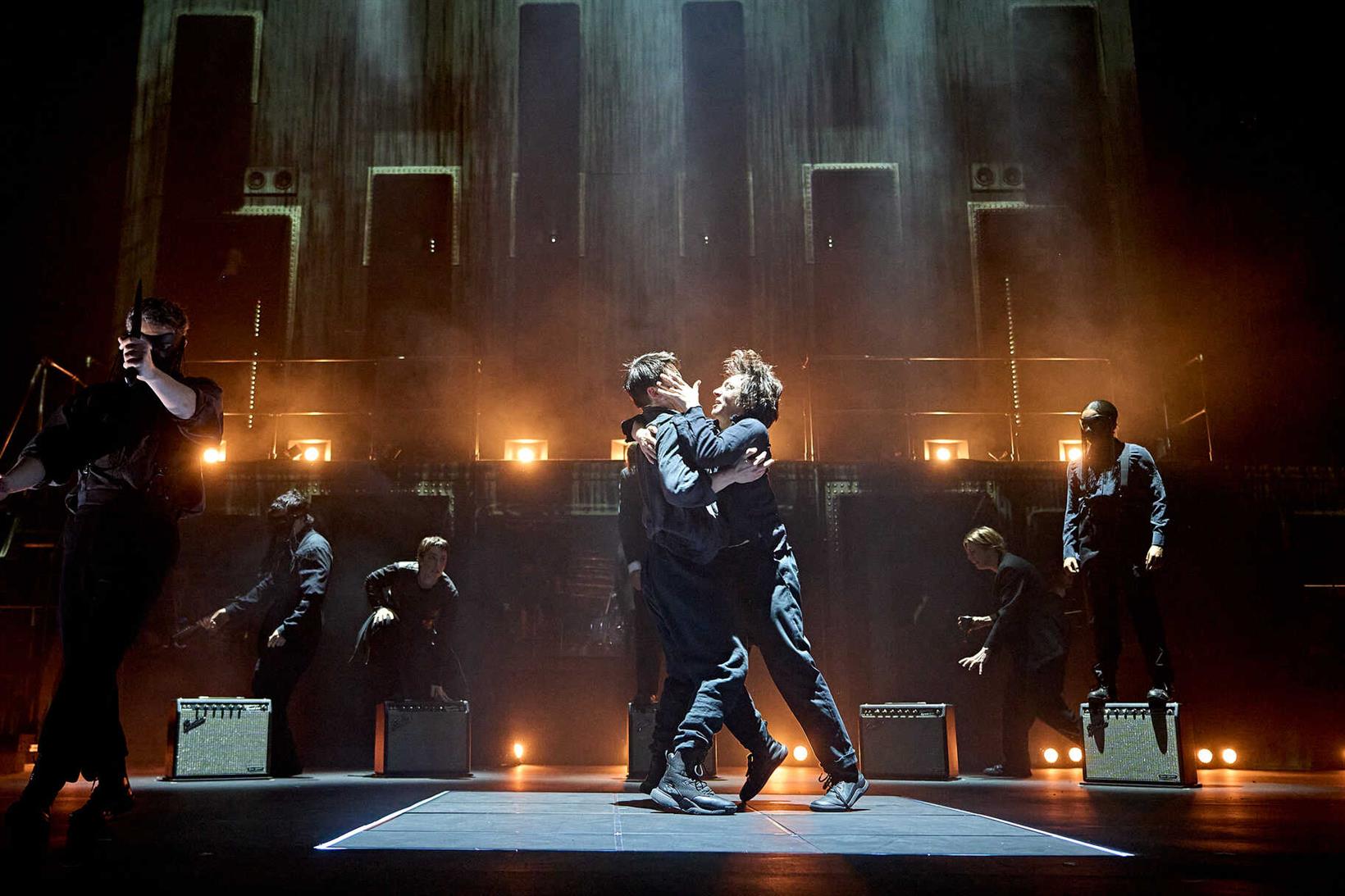Royal Shakespeare Company’s Hamlet Hail to the Thief expertly melds physical theatre, dystopian visuals, and a Radiohead album to create a masterclass in Shakespeare adaptation.

Hamlet Hail to the Thief | Factory International | 14th May 2025
Reviewed by Edith Powell
Shakespeare’s Hamlet tells the story of a prince agonised by an apparition of his dead father, who accuses his uncle, the new King Claudius, of murdering Hamlet’s father. Hamlet battles with his mother’s tyranny, his love for Ophelia, and his murderous rage for Claudius. Fascinatingly, when combined with extensive physical theatre, a mishmash of corporate and Berghain-style costumes, and Radiohead’s album Hail to the Thief, a breathtaking, modern production is born.
Christine Jones and Steven Hoggart’s adaptation opens with smoke billowing from the back ceiling of the industrial set, resembling a giant speaker. As the audience walks in, wires hang from above with a dozen black overcoats attached, matching the monochrome, dystopian costumes of the cast. Whilst they ascend after the first scene, their presence looms in the mind, connecting every overcoat worn by the characters to the hanging, fabric ghosts. This motif immediately establishes Shakespeare’s lifelong fascination with how death can make Kingship and power obsolete by grouping characters into corporate, death-like anonymity.
Samuel Blenkin delivers a fantastic rendition of Hamlet, treating the character with respect, care, and expertise as he delicately and meticulously brings Shakespeare’s words to life. I was enthralled by his ability to maintain an empathetic relationship with the audience while making them wonder all the while if he is actually mad. Paul Hilton delivers a spitefully passionate King Claudius, puffing on a cigarette, attacking the role with rigour. Hilton settles wonderfully into his role as villain, leaving room for introspection and moments of sensitivity.
Ami Tredrea’s Ophelia was a particular stand-out performance. She is lifted and carried by several characters throughout, leaving her with both a sense of powerlessness and a wistful, yearning quality. Tredrea perfectly encapsulates the harrowing journey of young love, betrayal, confusion, and grief in her performance. I was moved as Ophelia recited Hamlet’s ‘To be or not to be…’ monologue before her death. The repetition was a fantastic directorial choice, fitting perfectly with the grief-stricken character. Hamlet’s words take on a new meaning as she loiters on the edge of a rectangular pit after her father’s death. I felt each breath she took as laborious yet purposeful. In this rendition, Ophelia feels much more assertive. Whilst the men around her still manipulate her, the directors have given her agency and a life and mind of her own.
The music complements each scene perfectly, whether it’s the hauntingly beautiful vocals of singers Ed Begley and Megan Hill, or Hamlet and Ophelia’s solo renditions at pivotal points in their arcs. The presence of music is in the staging and props, with several large speakers being the predominant set in this stripped-back production. It is clear this project was a labour of passion and shared understanding by Thom Yorke, Jones, and Hoggart. Radiohead’s album is expertly transformed into a tense, melancholy score that weaves in and out of the dialogue like a graceful ensemble. It pushes the emotions at the right moments and strips itself down to a single hum at others. I thoroughly applaud the ambition and success of the two masterclasses of their forms – Radiohead’s album and Shakespeare’s play – combining so brilliantly. It is, in all honesty, a work of genius.
Steven Hoggart is a founding member of Frantic Assembly, and his work with choreographer Jess Williams is excellent. If one assumes that it is too ambitious to appreciate a play and an album concurrently, this production somehow complements both with its physical theatre. From Ophelia cueing an energetic score in the heights of her love with Hamlet, to Claudius being swung around the stage, grasping at symbolic objects, the dance and physicality act as translators of the fluidity of music, and the emotive dialogue of tragedy.
The play draws to a close with Horatio (Alby Baldwin) surrounded by bloodshed and the bodies of all the central characters. Baldwin looks out to the audience and begs for change in a marred system. The music swells into a crescendo of sorrow, the lighting warming to imply a single glimmer of hope for Horatio (and the audience) to rebuild a better future. The corporate overcoats begin to descend again, and the play finishes as they drop from their wires simultaneously to the floor. A powerful ending to a magnificent accomplishment.
I thoroughly recommend the Royal Shakespeare Company’s Hamlet Hail to the Thief, whether you are a fan of Shakespeare and Radiohead, or a complete stranger to both. This production will move you, shock you, inspire you, and demand your full, reflective attention. It’s a joyous, heartbreaking celebration of the arts and their potential. I have never been more impressed and moved by a Shakespeare production, and I hope this sparks more creative, genre-melding risks in the future.
Reviewed by Edith Powell
